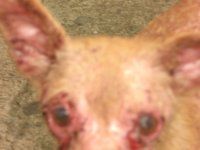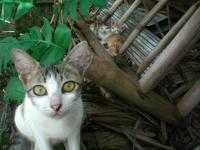What Vegetables Should *Not* Be Fed To Dogs and Cats
Sponsored Links
 Stay away from nightshade vegetables as some say they can cause skin problems and small sores in and around the mouth area.
Stay away from nightshade vegetables as some say they can cause skin problems and small sores in and around the mouth area.
Nightshade vegetables have been known to aggravate gastrointestinal problems, increase intestinal gas (like we need more of this), and cause indigestion.
Nightshade vegetables may also be a factor in arthritis, stiff legs and in calcium problems.
Vegetables our pets should avoid, including some of the members of the nightshade family, include:
- beets
- collard
- eggplants
- green peppers
- parsley
- potatoes
- onions (toxic to dogs and cats)
- chives (toxic to dogs and cats)
- garlic (toxic to dogs and cats)
- tomatoes
- spinach
- Swiss chard
Oxalic Acid:
- Beets, collard, parsley, spinach and Swiss chard are high in oxalic acid. Oxalic acid can lead to kidney stones and a depletion of calcium in the body
- Pets who suffer from or are at risk for kidney stones, gout, rheumatoid arthritis, osteoporosis and those whose stomach is easily irritated should definitely avoid foods high in oxalic acid.
- Oxalic acid combines with calcium to create an indigestible compound and since we are adding a lot of calcium to the food we are feeding, we want to avoid foods that do contain oxalic acid.
Did You Learn Something New?
Did you learn something new? I am sure you might have learned something new on this page but sadly, I have to admit the next and last page of Part 2 really doesn't tell you anything that you probably don't already know. Nonetheless, I know that some people are often overwhelmed initially when they are introduced to a wholesome homemade diet. So the next page is to help ensure you don't overlook the obvious!
- Meats That You Can Feed
- What Meats Should Not Be Fed
- Organ Meats
- Vegetables You Can Feed
- Vegetables You Should Not Feed
- Utensils Needed
 Meet Jumbo, the participant in
Meet Jumbo, the participant in 